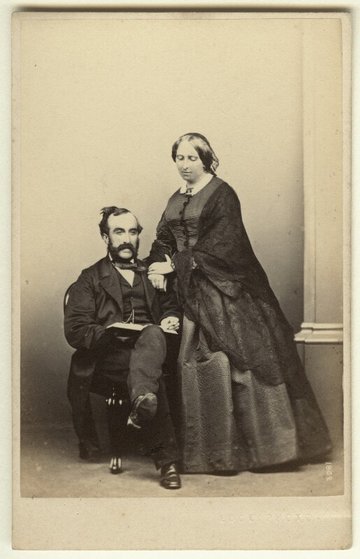
Monier Monier-Williams
‐
Professor of Sanskrit and founder of the India Institute at the University of Oxford
Other names
Sir Monier Monier-Williams
Place of birth
Place of death
Cannes, France
About
In 1860 Monier Monier-Williams was elected to the position of Boden Professor of Sanskrit at the University of Oxford, following an acrimonious campaign against his rival, Friedrich Max Müller. Monier-Williams had previously been Professor of Sanskrit, Persian and Hindustani at Haileybury College (the East India Company College) until 1858, when the college was closed. Monier-Williams remained Boden Professor until he retired in 1887. Shyamaji Krishnavarma worked as his assistant from 1879 to 1883.
Monier-Williams's major contribution to the landscape and pedagogy of Oxford was the foundation of the Indian Institute. In 1875 he first put the idea to Congregation to found an institute to provide a place of study for Indian Civil Service (ICS) probationers and Indian students at Oxford, combining a library, reading room and museum. He travelled to India in 1875, 1876 and 1883 to secure moral and financial support from Indians, particularly the Indian princes who also donated items for the museum and library. The foundation stone was laid by the Prince of Wales in 1883, and the Institute was opened by the Vice-Chancellor, Benjamin Jowett, on 14 October 1884, with Monier-Williams giving the address.
Nilakantha Goreh, Benjamin Jowett, Shyamaji Krishnavarma, Max Müller, Cornelia Sorabji.
A Dictionary of English and Sanskrit (London: Allen & Co., 1851)
(trans.) Kalidasa, Sakuntala (Hertford: Stephen Austin, 1853)
A Practical Grammar of the Sanskrit Language (Oxford: Oxford University Press, 1857)
Indian Wisdom (London: Allen & Co., 1875)
Hinduism (London: Society for Promoting Christian Knowledge, 1877)
Modern India and the Indians (London: Trubner & Co., 1878)
Religious Thought and Life in India (London: John Murray, 1883)
Buddhism in Its Connexion with Brahmanism and Hinduism, and in Its Contrast with Christianity (London: John Murray, 1889)
Macdonell, A. A., ‘Williams, Sir Monier Monier- (1819–1899)’, rev. J. B. Katz, Oxford Dictionary of National Biography (Oxford University Press, 2007) [http://www.oxforddnb.com/view/article/18955]
Morris, Henry, Sir Monier Monier-Williams, KCIE, the English Pandit (London: Christian Literature Society, 1905)
Symonds, Richard, Oxford and Empire: The Last Lost Cause? (New York: St Martins Press, 1986)
Papers, Indian Institute, Oxford
My desire has always been that the Indian Institute should have so to speak, two wings, one spreading itself to foster Eastern studies among Europeans, the other extending itself to foster Western studies among Indians.
The Indian Institute in the University of Oxford: An Account of the Circumstances which have led to its establishment, a description of its aims and objects, a report of the addresses at the opening ceremony etc (Oxford: Horace Hart, 1884)
Image credit
Sir Monier Monier-Williams; Julia Grantham (née Faithfull), Lady Monier-Williams, by Thomas Edge, albumen carte-de-visite, early 1860s, NPG x29295
© National Portrait Gallery, London, Creative Commons, http://creativecommons.org/licenses/by-nc-nd/3.0/
